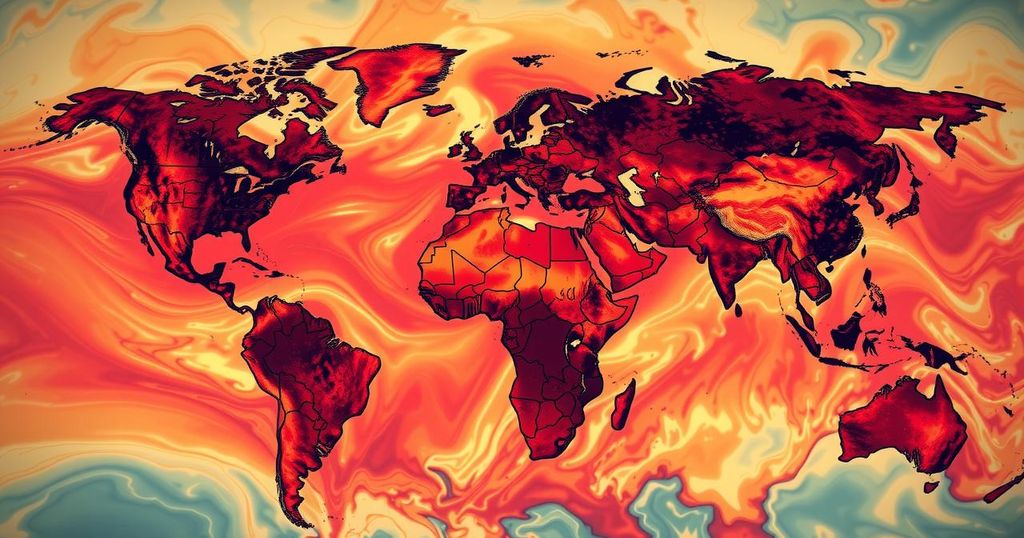In 2024, climate change led to an average of 41 extra days of dangerous heat globally. Research indicates that significant weather events related to climate change caused high mortality and displacement rates. Experts urge immediate action to combat the worsening climate crisis and adapt to its effects.
In 2024, human-induced climate change resulted in an alarming average of 41 additional days of hazardous heat worldwide. Research conducted by scientists from World Weather Attribution and Climate Central indicates that climate change exacerbated numerous devastating weather events throughout the year, making 2024 likely the hottest year on record. The analysis highlighted a range of climate-related disasters, from severe heatwaves to destructive storms, which disproportionately affected marginalized communities.
The report details the extent of heat exposure, particularly in vulnerable regions. For example, areas such as Northern California, Death Valley, and parts of Mexico and Central America experienced extreme daytime temperatures. Moreover, children in West Africa faced heightened risks from the oppressive heat that forced educational institutions to close in several countries in South and Southeast Asia. The study emphasizes the correlation between climate change and escalating incidents of extreme weather, noting that many regions experienced over 150 days of extreme heat due to human activities.
Friederike Otto, a leading scientist at World Weather Attribution, stated, “The finding is devastating but utterly unsurprising: Climate change did play a role, and often a major role in most of the events we studied.” This assertion reflects the consensus among scientists that continued reliance on fossil fuels will only exacerbate the adverse effects of climate change.
Despite the alarming statistics, researchers stress that the fatalities associated with heat can often be underreported, complicating efforts to advocate for prioritizing awareness and action against climate change. Otto remarked, “Heat waves are by far the deadliest extreme event, and they are the extreme events where climate change is a real game changer.”
The report also evaluated 29 extreme weather events this year that resulted in significant loss of life and widespread displacement, with 26 of those events directly linked to climate change. Although the El Niño phenomenon contributed to some of the extreme weather, research indicates that climate change played a crucial role.
The findings pose a critical warning as the world nears the 1.5 degrees Celsius limit established by the Paris Agreement, with scientists predicting that we are approaching this threshold. Julie Arrighi of the Red Cross Red Crescent Climate Centre emphasized the need for proactive measures, noting that each country has a role in adapting to climate challenges to mitigate damage and fatalities from extreme weather incidents.
Essentially, 2024 serves as a pivotal moment, illustrating the urgent need for decisive action against climate change to protect the planet and its inhabitants. As stated by Jennifer Francis, climate scientist, “Extreme weather will continue to become more frequent, intense, destructive, costly, and deadly, until we can lower the concentration of heat-trapping gases in the atmosphere.”
The topic of climate change has become increasingly urgent as global temperatures rise and extreme weather events become more frequent. Research indicates that human activities, particularly the burning of fossil fuels, are major contributors to climate change, leading to a range of adverse environmental impacts. As the planet nears critical warming thresholds, scientists and environmental advocates emphasize the necessity for comprehensive strategies to combat climate change and prepare for its inevitable consequences. The year 2024 has uniquely illustrated these challenges through intense heatwaves and destructive weather patterns, with studies linking many of these occurrences directly to climate change.
The findings from research conducted throughout 2024 serve as a stark reminder of the escalating dangers posed by climate change. With rising temperatures and increasing occurrences of extreme weather events, the need for immediate, decisive action is more pressing than ever. Addressing these challenges requires a collective effort across nations to mitigate climate impacts and adapt to the changing environment effectively.
Original Source: www.nationalobserver.com






